Fanfiction and LGBT+ Representation
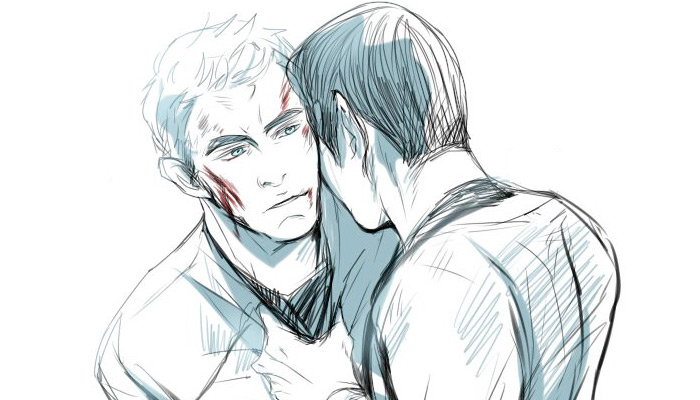
This year, Archive of Our Own (AO3), an online fanfiction archive and network, won a Hugo award for Best Related Work, an award never before given to a website or unpublished work. For fans of literature, the significance of this is astounding: Hugo Awards have almost always been given to notable literary or dramatic works, typically in the tradition of print media. Fan fiction, or fanfiction, by contrast, is largely an online medium today, and encompasses unpublished, written fan works based on other media, such as comics, television, film, and books. Perhaps because it is written by “amateurs” or because it is unpublished, fanfiction has often been scoffed at as unprofessional or self-indulgent. But for fans, fanfiction can be a way of reshaping popular media to reflect their identities. Members of the LGBT+ community in particular often criticize popular media for lacking compelling narratives surrounding LGBT+ themes, and when left unsatisfied, many fans turn to fanfiction to see themselves in the media they otherwise enjoy.
Despite how it has existed for centuries, fanfiction or “fanfic” continues to be treated as a dirty word, both on- and offline. Fanfiction fills a void in representation for LGBT+ fans, while building and maintaining a fanbase for its media source. Perhaps this Hugo Award signals a new understanding of fanfiction, and maybe fanwork, as a whole: that fanfiction’s inherent transformative abilities offer endless creative opportunities for amateur content creators, and despite the negative aspects of an online, anonymous community, it deserves recognition as a driving force for diversified media.
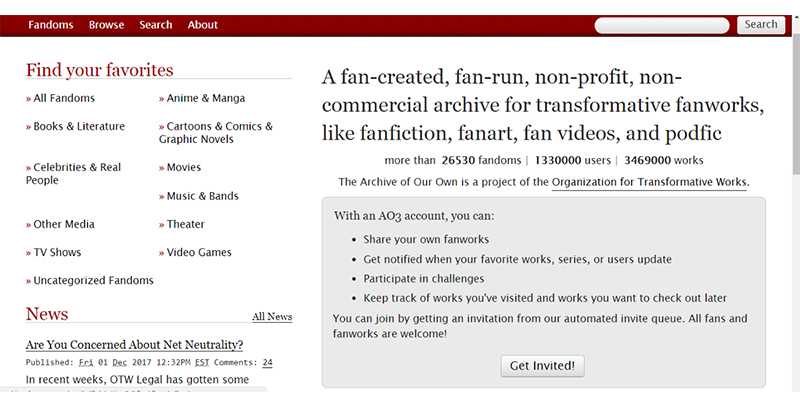
What is fan fiction?
When you hear the term fanfiction, what comes to mind? For most people, fanfiction is nearly synonymous with anonymous, eroticized fan writings, posted online and shamefully hidden from public circulation. But fanfiction, or fanfic, includes and covers an astonishingly wide expanse of fan work and artistry that is largely dismissed by non-fan communities.

Fanfiction is ultimately about taking an existing story, setting, or characters, and altering it in some way. It “continues, interrupts, or just riffs on stories and characters other people have already written about” usually in an unpaid, volunteer fashion 1. Whether someone is rewriting the plot to an episode of Supernatural or creating an “alternate universe” where Fox Mulder and Dana Scully live a normal life of The X-Files, fanfiction is an expression of passion for a work and how fans just can’t get enough.
Fanfiction also helps fans find other fans they relate to, and builds connections across a fanbase through creative work. When fans come together, usually via an online platform, they may develop into a “fandom” with increasingly complex inside jokes, memes, and tropes surrounding characters or settings from their favored media. In some ways, fanfiction can inform communities, and communities of fans can inform fanfiction. It garners community, especially with websites like Archive of Our Own and FanFiction.net, which encourages commenting and feedback.
Some works become so well-known, either positively or negatively, that their presence has become synonymous with the fans themselves. One such work is the Harry Potter spin-off, “My Immortal”. Despite its terrible grammar, strange and oft-manic plotlines, and excessive number of chapters, the series has inspired an array of parodies, homages, and re-enactments, spanning from live action YouTube interpretations to fan art. The mystery surrounding the identity of the true author and its combination of early-2000s emo culture with a New York Times bestselling franchise only deepened the interest in the work 2. While it continues to be largely perceived as comically cringe-worthy, its presence in popular culture as a meme has expanded beyond the limits of fanfiction creators and consumers.
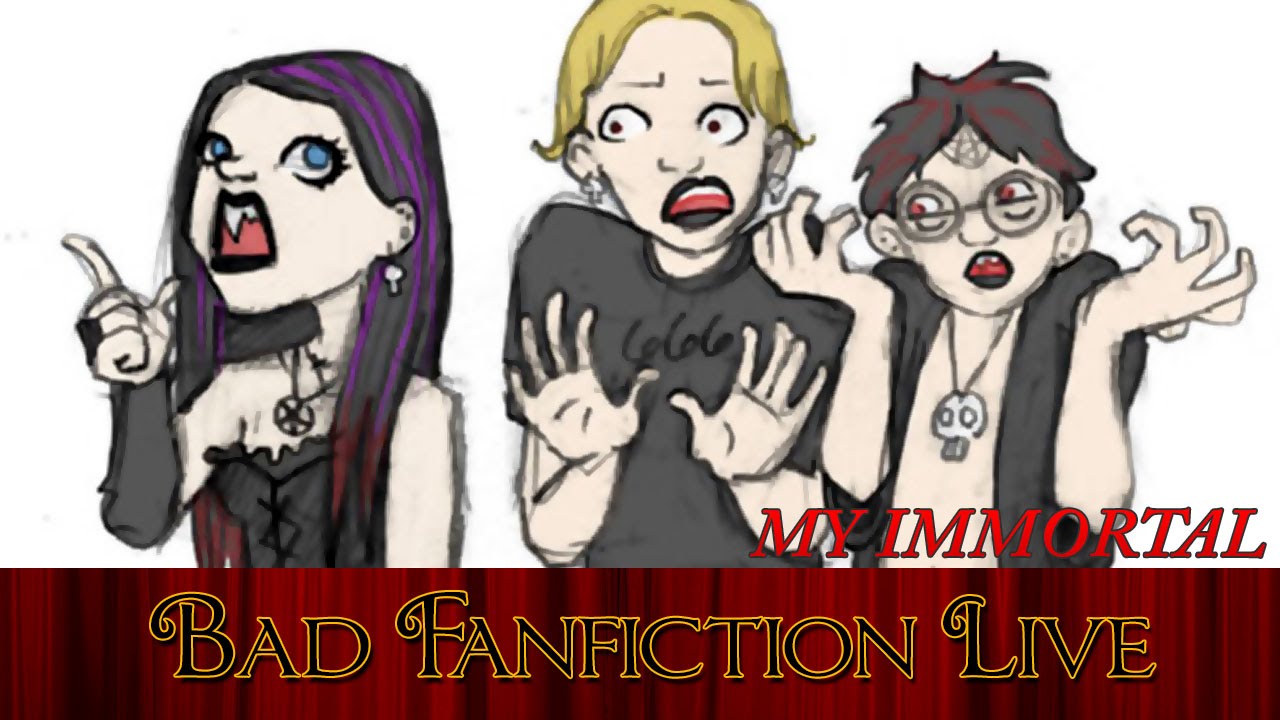
Like the author of “My Immortal”, most fanfiction authors use pen names or remain anonymous online–for privacy, or for fear of backlash. The anonymous nature of fanfiction, and therefore many members of fandom, allows opacity in the way that individuals express their gender and sexual identity. These communities “increasingly offer[s] a space where gender, like sexuality, is not an either/or phenomenon, and gender and sexual dissent, even rebellion, has long been a part of fic’s story,” states Anne Jamison, in her book, Why Fanfiction is Taking Over the World.
Fanfiction isn’t just about eroticism–but it can be. The brilliance of fan works is that they can be anything at all.
The History of Fanfiction
To really appreciate the power that fanfiction can wield, it is critical to look at its history.
As Jordan West of the popular media critique site The Mary Sue states, fanfiction has been in your life at every turn, probably without you even realizing it. “If you’ve taken an English class in America, you’ve almost certainly been assigned fanfiction to read, not just in the form of Beowulf and Shakespeare, obviously, but also in the form of books like Johnny Tremain, Wide Sargasso Sea, and Paradise Lost,” among others 3. Note that many of these books, especially those espoused as “classics” in the literary world, have largely been written by men.

Long before people were posting their fanfiction online, fans of written and visual works were writing and sharing their own “amateur” works in fan circles. The Sherlock Holmes stories inspired a number of amateur writers to devise their own mysteries, calling themselves The Sherlock Holmes Society and the Baker Street Irregulars 4. Long before that, William Shakespeare riffed on popular legends, characters, and tropes to write plays that spoke to audiences for centuries after. Even longer before that, Greek myths were shared through oral tradition–and even then, there were detractors of the written word. As long as there has been entertainment and the willingness for fans to share their feelings about it, fanfiction has existed.
While the term “fanfiction” itself may have originally arisen from amateur-written original works published in magazines in the late 1800s and early 1900s, fans of the television program Star Trek popularized the term and the practice. Fans are notoriously remembered for the fan “zines” or non-published, fan-printed mini magazines of “slash” fiction, pairing together characters Spock and Kirk in a romantic setting. The romantic pairing was shortened to “K/S”, which gradually informed the slang for fictional gay romance, as written in fanworks, as “slash” 5.
This is likely where the connotation of fanfiction with homoeroticism began; as “slash fiction” grew, it began to incorporate other identities and expressions. But this is also where the negative association of fanfiction with lewdness or distastefulness; it can’t be a coincidence that fan-written works suddenly gained a negative association when a large group of fans favored a gay romance. A romance that, it should be noted, never would have emerged onscreen. “Slash” or homoerotic works fill gaps created by Hollywood’s own blindness to its misogyny, heteronormativity, and machismo.
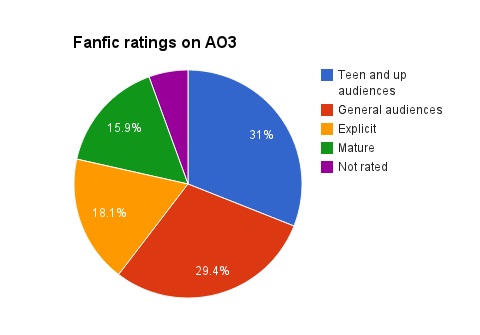
As the internet became increasingly accessible and online fandom communities flourished across burgeoning social media websites, fanfiction also flourished. In the early 2000s, LiveJournal and FanFiction.net offered users a place to publish and share their written works, including erotic and adult content. But as fans took creative liberties, a fire was lit beneath the debate over freedom of speech in fandom, especially as websites attempted to monetize their clout. In 2007, controversy arose when LiveJournal began running on ad-supported revenue, rather than user support, which pushed site moderators to remove and delete controversial content 6. Many fans considered this reaction as censorship, and left the site. Fanfiction.net experienced several “purges” of content deemed NC-17 rated by site moderators, which consisted of banning users and removing material. Fans reacted quickly by moving to different websites, including Tumblr and Archive of Our Own 7.
In 2007, Organization for Transformative Works (OTW) was “established by fans to serve the interests of fans by providing access to and preserving the history of fanworks and fan culture in its myriad forms” because they “believe that fanworks are transformative and that transformative works are legitimate” 8. As a nonprofit, OTW created Archive of Our Own, named for Virginia Woolf’s A Room of One’s Own, as a webarchive for fanworks. As a defender of fanworks and fancontent, it quickly became popular for its no-holds-barred freedom of expression, hosting both explicit and non-explicit fanworks.
Queering Modern Media
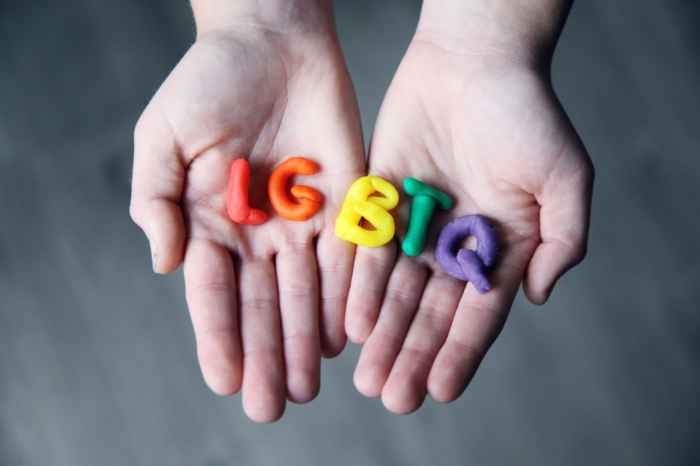
Due to its nature of anonymity, fanfiction has always been an inviting space for young writers who are “still figuring it out” in regards to their sexual or gender expression. In a 2013 survey of Archive of Our Own users, only 38% of respondents identified themselves as heterosexual. Around 80% of respondents identified as women, and more than 50% of the survey’s respondents identified as women who were of sexualities other than heterosexual 9. These statistics imply the majority of users of the site–as of 2013– were largely demographic minorities in the mainstream media they wrote fanfiction for.
The heavily-gendered nature of fanfiction communities also may play a part in why and how fanfiction is somewhat looked down upon in popular culture. In an article for Vox, Constance Grady writes, “there’s a special ire reserved for the particular corner of the web where people make transformative works about the media they love — and given that this corner is primarily composed of young women, it’s hard to avoid the conclusion that this ire is gendered” 10. Fans, especially those who celebrate certain romantic pairings, have been familiar with open hostility targeting their communities for decades. But these are communities perceived to be dominated by women; for example, when the Beatles were perceived to be a British boy band, its fans were reduced to crazed fangirls, dubbed “Beatlemania”. In contrast, sports fans–who are known in some areas of the world for literally rioting over game results–are never considered part of fandom, largely because it’s overwhelmingly seen as masculine, manly, and therefore more legitimate as an interest.
Feminine media has always been portrayed as dangerous, unartful, or just downright disgusting. At least until it is adopted as mainstream–then, everyone can enjoy it, and the fans are no longer touted as sex-crazed or out of their minds, like with Beatlemania. While pervasive in many forms of media, the double standard in creative writing becomes obvious when you consider how many “classic” works of literature that riff on popular stories, myths, or legends–like Paradise Lost, Dante’s Inferno, or any of Shakespeare’s plays–are treated as legitimate and exemplary, partly because they were written by and for men. The fact that a large percentage of fanfiction authors identify as female may play into this double standard, affecting how it is perceived as a “feminine” medium.
In reality, there is no such thing as “feminine” media or “masculine” media–but a large number of feminine individuals may coalesce and abscond upon a certain piece of media due to the potential to transform into something for them. Whether it’s unconventional characters in Good Omens, a bunch of nonthreatening boys in a volleyball manga, or the hypermasculine battles of The Avengers, fanfiction offers a space for women, LGBT+, and gender non-conforming individuals to remake their favorite media into something that reflects them or their interests. Media is still largely created with straight males in mind. And doing anything to remake that norm–of threatening the status quo–makes creators a target. As Grady states,
“Young women are so attacked for loving the media they love that it is a radical act for a young woman to love something unashamedly. And transformative fandom is the most radical act of all, because it reverses that ‘lady thing to respectable thing’ process. It takes a piece of media that may not have been designed for young women and makes it for young women.”
For everything from television to comic books, individuals who see themselves as minorities may not see themselves in modern media, and therefore react by transforming their media on their own.

But why women, and LGBT+ individuals in particular? Why are they the ones writing and being featured in fanfiction? It largely comes down to the lack of quality representation in media. The disposable woman trope is a well-documented phenomenon wherein a female character is killed off to further the plot for other, usually male, characters 11. And it gets even rougher if those women belong to other minority groups, like race or sexual identity. For example, the 2015-2016 television season was the deadliest on record for lesbian and bisexual female characters, with 42 women killed off in shows available to U.S. audiences (excluding international shows) 12.
Entire databases have been created to track LGBT+ characters being killed off in television shows, including LGBTfansdeservebetter.com and Does an LGBT person die?. In some genres, they’re practically invisible. In anime and manga, outside the oft-fetishized yuri and boy love manga, there are extremely few examples of gay or lesbian characters. In Marvel and DC comics, artists and writers often find their hands tied when it comes to how they portray gay or lesbian characters, if they are given the freedom to do so at all 13.

By writing favorite characters as gay, trans, bisexual, queer, or of a different race, individuals who consume media but fail to see themselves represented within it are able to create the scenarios that they most relate to. In an environment where LGBQ young people are more than twice as likely to feel suicidal, and over four times as likely to attempt suicide, compared to their heterosexual peers 14, producing media depicting complex, realistic LGBT+ individuals of all ages can be a form of encouragement and support for otherwise marginalized groups.
It also helps writers of particular identities to feel less alone, as they see themselves finally represented in media they consume. Kellye Ann Guinan contends that fan fiction has a communal aspect of reiterating similar tropes, much like communities repeat stories as part of their communal folklore.
“Women and queer individuals use fanfiction as a means of showing their struggles and needs by reinterpreting popular media. In this sense, television shows, movies, comics, video games, etc. all function as a shared symbolic language through which individuals can explore identities closed off to them in real life. Fanfiction is the way in which minorities can give themselves a chance at being the hero or the villain. Because it takes the same story cores and reuses them time and again, it can be seen to follow a process of folklore (3)” 15.
In this way, fan fiction is culturally subversive, but also connective: it allows individuals to bring out the pieces of themselves they would otherwise hide away. It challenges cultural norms while invoking creativity, shaping individual expression into collective expression, and forming a subculture of its own.
The Problems with Fanfiction
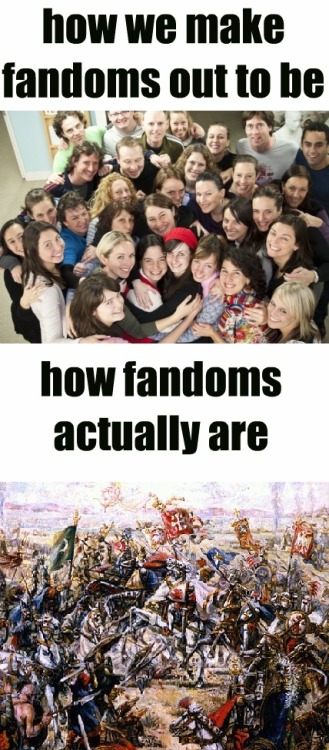
While fear-mongers denounce fanfiction and fandoms as unable to separate reality from fantasy, the most evident problems with fanfiction tend to stem from inter-community conflict. When communities come together to express their passion for something, there’s bound to be a few impassioned disagreements. Great fissures can be created between fan creators. The emergence of the term “wank” or “shipping wars” can be linked to serious disagreements about how characters, settings, events, and morals of a piece of media should be portrayed through fan work, whether it is fanfiction or artwork. The arguments can be linked to the expression of minority gender and sexual identities.
Passionate fans of a series may feel strongly about certain romantic couples and therefore “ship” them. While much of this can be fan-created romanticism, sometimes creators lend creedence to certain “ships” and sexual identities by claiming them as canonical. Anne Jamison, author of Why Fanfiction Is Taking Over the World, writes in her chapter about the Harry Potter series that J.K. Rowling’s involvement in post-series fan enjoyment of the characters seriously molded attitudes toward the potential of fanfiction as transformative.
“Although the sexual life some fanfiction imagines for Harry Potter’s underage characters has long been a source of discomfort for their creator (and for a different set of fans), J.K. Rowling’s post-series announcement that beloved wizard Dumbledore was gay fixed in canon the kind of possibility in which fanfiction had long been dwelling. Harry Potter slash helped shape and challenge attitudes toward sexual diversity among the generation that grew up reading it and arguing about it (a lot) online” 16.
The idea of paring two characters together, romantically, sexually, or platonically aligns with the preferences of the fanfiction writers and/or readers. Combativeness over these pairings can, in turn, be interpreted as comabatting over one’s identity as it is perceived to be reflected in a favorite work. This is why fanworks can be so incredibly personal: they reflect personal, daily struggles with identity and sexuality, not necessarily just sexual fetishization.
“The fandom dynamics of wank–though I do not believe they show off the best of fanfiction or fan communities–are telling because they often serve as proxy controversies for working out complex but more abstract arguments about the nature of authorship, textual boundaries, and individual v. community ownership, and responsibility” 17.
These “ships” and romantic pairings may not even necessarily represent their authors as a one-to-one ratio; while some fanfic may clearly be a way for the author to “self-insert” themselves into the work to express a reflection of how they see themselves and their sexual or gender identity, it may also be a way of subverting exhaustive tropes. This kind of artistic expression is deeply personal, and likely emotional, on top of being a major investment of time, energy, and attention, often garnering or utilizing online clout.
The Future of Fanfic
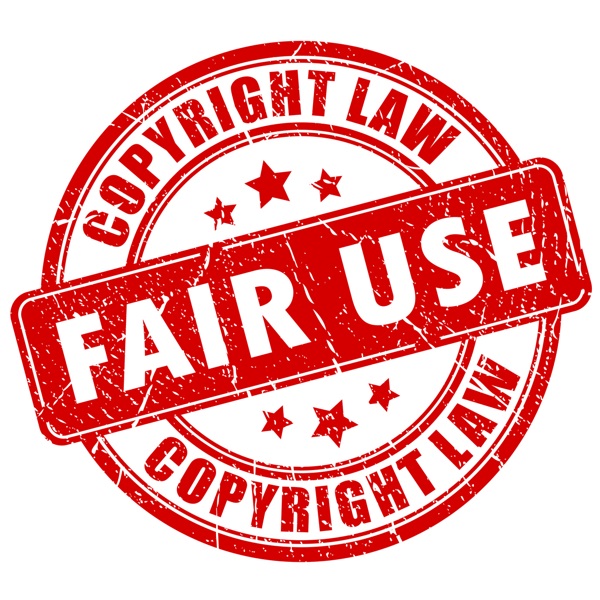
As it stands, fanfiction is likely to only grow. Communities of fans of all kinds of media–comics, film, television, anime, literature–spring up with astonishing quickness, thanks in part to widespread internet access and social media exposure.
But will the “underground” nature of fanfiction ever change? When might, say, a middle-aged mother of two feel proud to post a link to her Avengers fanfiction on a public Facebook status?
With the nature of fanfiction being about subverting tropes and gathering around minority identities, it’s not likely that it will ever go mainstream. Gender and sexual minorities continue to seek safe spaces to express themselves online, and the simultaneous inclusivity and exclusivity of these spaces tend to welcome the disenfranchised and exclude the intolerant.
However, the controversial nature of fanfiction–anyone being able to write anything–offers a platform for pedophilia and incest, among other unacceptable dynamics. Regardless of where you stand in the debate of freedom of speech and fanworks, there should and could be consequences of being associated with a platform that supports contentious works or sub-genres.
Not to mention the copyright issues. Content that uses characters, settings, or even similar concepts can be subjected to copyright infringement, resulting in the pressure to remove the work, close the website, or even fine the content creator. Fanfiction is legal in the United States if it follows the guidelines as a “derivative work” meaning that it acts as “an expressive creation that includes major copyright-protected elements of an original, previously created first work. The derivative work becomes a second, separate work independent in form from the first” 18. Despite this definition, the legal gray area inhabited by fanfiction and other fanworks can leave each individual piece up for scrutiny.
To prevent infringing on media copyrights, sites like AO3 have formed around a nonprofit organization, ensuring that neither the website moderators or the content creators receive any monetary compensation for the works. While most content creators seem to be fine with this arrangement, it begs the question: how close to the original work does something need to be to infringe on a copyright? How does fanfiction perform work in a way that’s different from a remix of a Top 40 song?
These questions can’t be answered here, or in any fanfiction. Instead, appreciating fanfiction as remixed media lends some credence to the efforts of fan creators, who spread popularity for a series or work, and can be attributed for maintaining the popularity and success of a series. With community feedback, concept development, and improving writing skills, fanfiction can easily become a spring-board to unique content-creation. So, be mindful the next time you mock that Avengers alternate universe romance fanfic: it might be written by tomorrow’s New York Times bestselling author.
Works Cited
- Jamison, Anne Elizabeth, and Lev Grossman. Why Fanfiction Is Taking Over the World. Smart Pop, 2013. ↩
- Riesman, Abraham. “The Bizarre, Unsolved Mystery of ‘My Immortal,’ the World’s Worst Fanfiction Story.” Vulture, Vulture, 12 Mar. 2015, https://www.vulture.com/2015/03/bizarre-unsolved-mystery-of-my-immortal.html. ↩
- West, Jordan. “None Of This Is New: An Oral History Of Fanfiction.” The Mary Sue, 2 Nov. 2014, https://www.themarysue.com/none-of-this-is-new-an-oral-history-of-fanfiction/. ↩
- https://www.themarysue.com/none-of-this-is-new-an-oral-history-of-fanfiction/ ↩
- Staff, Newsweek. “Star Trek: Spock, Kirk and Slash Fiction.” Newsweek, Newsweek, 13 Mar. 2010, https://www.newsweek.com/star-trek-spock-kirk-and-slash-fiction-79807. ↩
- Stephen, Bijan. “Tumblr’s Porn Ban Could Be Its Downfall – after All, It Happened to LiveJournal.” The Verge, The Verge, 6 Dec. 2018, https://www.theverge.com/2018/12/6/18127869/tumblr-livejournal-porn-ban-strikethrough. ↩
- “FanFiction.Net’s NC-17 Purges: 2002 and 2012.” Fanlore, https://fanlore.org/wiki/FanFiction.Net’s_NC-17_Purges:_2002_and_2012. ↩
- “What We Believe.” Organization for Transformative Works, https://www.transformativeworks.org/what_we_believe/. ↩
- “AO3 Census: Masterpost.” Fanlore, https://fanlore.org/wiki/AO3_Census:_Masterpost. ↩
- Grady, Constance. “Why We’re Terrified of Fanfiction.” Vox, Vox, 2 June 2016, https://www.vox.com/2016/6/2/11531406/why-were-terrified-fanfiction-teen-girls. ↩
- Andrews, Travis. “’Disposable’ Women? TV Wives Keep Dying on Shows Centered on Male Actors.” The Washington Post, WP Company, 29 Apr. 2019, https://www.washingtonpost.com/news/morning-mix/wp/2017/10/06/disposable-women-tv-wives-keep-dying-on-shows-centered-around-male-actors/. ↩
- Out Magazine. “62 Lesbian & Bisexual Female Characters Killed Over Past Two Television Seasons.” OUT, Out Magazine, 9 Mar. 2019, https://www.out.com/news-opinion/2017/7/11/62-lesbian-bisexual-female-characters-killed-over-past-two-television-seasons. ↩
- Abad-Santos, Alexander. “Why We Worry About DC Comics’s Gay Characters.” The Atlantic, Atlantic Media Company, 29 Oct. 2013, https://www.theatlantic.com/entertainment/archive/2013/10/why-we-worry-about-dc-comicss-gay-characters/310076/. ↩
- Human Rights Campaign Foundation. “Mental Health and the LGBTQ Community.” https://suicidepreventionlifeline.org/wp-content/uploads/2017/07/LGBTQ_MentalHealth_OnePager.pdf. ↩
- Guinan, Kellye Ann. “Culture and Community Online How Fanfiction Creates a Sense of Social Identity by Reshaping Popular Media.” Culture and Community Online: How Fanfiction Creates a Sense of Social Identity by Reshaping Popular Media, Honors College of Middle Tennessee State University, 2017, https://pdfs.semanticscholar.org/1f8e/b1c8c00ac344c595817b3ab1a9bdd5eec025.pdf. ↩
- Jamison, Anne. “Lessons From the Megafandoms: Harry Potter and Twilight.” Why Fanfiction Is Taking Over the World. ↩
- ibid ↩
- Gribben, Bailey. “Fanfiction: A Legal Battle of Creativity.” Reporter, https://reporter.rit.edu/views/fanfiction-legal-battle-creativity. ↩
What do you think? Leave a comment.







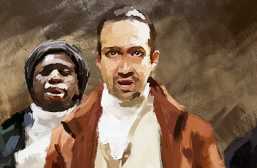
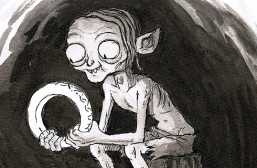


As a female Yaoi writer (anime) I have to praise this piece.
For me, gender roles (or lack there of) is essential. That is one of my favorite parts of writing my pair of choice (Motomiya Daisuke/Ichijouji Ken, FTW–Yeah!). You don’t have these pre-defined roles, domestically or even sexually.
If I want Ken to be a bit of a homebody, I can explore that idea within the basic confines of his personality (what we call Daiken). If I’m considering what life would be like with Daisuke assuming the more submissive roll, cool. I denote that with a Kensuke.
If I decide that for the purposes of this story that they exist in as humanly possible to a 50/50 world or if, that their roles change as back and forth as we move public vs private lives, I do so. And I call that whatever the heck I want because, by god, I’m writing the story.
To me, yaoi offers a chance to explore the full depth of a character’s personality in a way that I haven’t really been able to in fics where I’m writing about a hetero couple. That may be (is) more of a personal issue then a “this applies to everyone” sort of thing. Still, I doubt I’m alone in my feelings/faults.
BUT, all that being said: a big part of the appeal is the smut. And yeah. Two… way better than one. For whatever twisted, no doubt vaguely evolutionary, reason may exist, my female brain (and, research shows many female brains) really loves the slow, subtle burn and/or power exchange that takes place when two guys get it on. Just saying. 🙂
Really great article. To those who can’t quite get themselves to write fanfiction or create original stories, I would suggest to research and support authors. There are lists outs such authors I can share, if you are interested.
If I know a book is written by and LGBT+ author of any kind I will jump on it ahead of others, and I will actively seek them out as we’re not always as widely marketed as we should be!
If it’s okay to make straight characters gay, then is it perfectly okay to make gay characters straight?
This is a really interesting question, because you’ll get answers all across the spectrum (pun intended) about whether or not it’s ok. My personal take: if it’s transformative, it serves a purpose. Maybe a character is gay in canon, but you make them bisexual or pansexual and put them in a heterosexual relationship. Maybe they’re transgender, and they end up in a heterosexual relationship. And what is “straight” anyway? Sexuality is a spectrum. The great thing about fanfiction is you get to decide where you want characters to fall along the spectrum. It can be considered harmful if you decide you want to write about conversion therapy or a character “realizing” they’re straight, because there’s a lot of harmful tropes and real-world representation of that in media already. Sexuality is a spectrum, and fanfiction offers freedom to explore it!
Most authors who care feel that making straight characters gay is OK specifically because so many series don’t have many (or, often, any) canonically gay characters for them to write about. You could probably expect a lot of backlash if you were to take one of those rare canonically gay characters and make them straight, because even if your motivations had nothing to do with discrimination, and even if (logically) turnabout should be fair play, it would still be interpreted negatively by readers. Heck, I’ve been ripped to pieces before just for insinuating that a character was straight, which was already firmly established in canon, because other fans had designated them as the Token Gay Fanon Stand-in for that series. I can only imagine what kind of hatespam would result from making a canonically gay character straight.
It’s the problem of toxic fandom, not the author. LGBT fandom crowds don’t automatically have the right to hatespam the authors that decide to coin flip a gender/orientation to the other side for once.
So, it’s okay, but you might be flamed, but it’s still okay.
Murky waters!
Realistically it all comes down to who you’re writing for, right? What kind of story are you trying to tell and does the change to their sexuality actually matter to it.
Personally I think making them Bi-Sexual would be better. I like to romanticize that as they can love anyone because of who they are as a person, rather than because of a specific gender.
Some people think that making a character bisexual makes them “less gay.” To me, that opinion is horrible and biphobic, as bi people are barely portrayed positively.
To me, making a character bi is a good solution to both shipping and representation issues.
In my view, there is at least one situation in which it’s okay to reimagine a gay character as “straight”–or at least, in a heterosexual relationship of some sort–and that’s when there’s something potentially disturbing or offensive about the character being gay in the first place. I think about this a lot in the context of the anime “Deadman Wonderland” because my favorite character in it is supposed to be gay, but the problem is the writers decided to express this by having him murder the pregnant wife of a straight man and then try to stalk and brainwash said straight man into becoming his partner in crime! At that point, it’s hard for me to see how his being “gay” is any kind of triumph for gay rights (particularly since there’s no actual narrative reason for his interest in this other guy to be sexual, as opposed to simply platonic).
That being said my personal take on it is that a character’s sexual orientation should be ultimately up to the audience to decide, unless it’s directly relevant to the plot somehow (i.e., the story is about someone coming out as gay, etc.). I’ve always found it tasteless when authors deliberately put their thumb on the scale, so to speak, and said that this or that character is definitely straight/gay/bi, etc.
So long as the gay character isn’t “cured”, its fine.
Short answer is no from me. Speaking as a queer person, there are so few canon queer people in the media that it’s inherently problematic to make those few revert to the CisHet paradigm. The simple fact of the matter is: CisHet is predominantly the default setting and there is a lot of legwork to do before it’s appropriate to CisHet queer characters.
That being said, it doesn’t apply to all circumstances. If for example you’re flipping everyone’s gender/sexuality for some reason, yes, it is appropriate to CisHet a queer person. If theres a narrative reason to CisHet a queer person, perhaps. But if you’re CisHeting a queer person, simply for the sake of making them CisHet then Id say it’s inappropriate.
There are so few gay characters that it always feels a little bit messed up, but I personally don’t care if people ship m/f with these characters. I’m bi but sometimes I kinda ship gay characters in a fanfic way with opposite sex characters because of the chemistry. I think it mostly hinges on why someone does this and if there’s any homophobic intent. In a perfect world, sexuality being swapped and stuff in fic won’t be a big deal, but some people might have a bone to pic. Most people will just hate the fics and move on, but antis might come for you.
It is, but people that read fanfiction of gay characters often do so because they want to read fanfiction about gay characters. It means at least someone will be annoyed.
Personally, for me, it comes down to audience. I’ve got abuse (although I just ignored it because I’m an adult) because I didn’t write a fan favourite, who isn’t gay in canon, as gay but straight instead. Equally there were people who actually enjoyed it because they were sick of everyone writing the character so ooc and that, like I said, was just a gay character because the fandom liked it that way.
What’s frustrating (and I can’t imagine gays like it much) is that most of slash is oversexualised garbage. Authors’ motivation for writing often seems to be “ohmigawd that guy is so hot and that other guy is so hot too let’s make them a pair.” Plot, character development, character traits, a sliver of canon compliance or canon-consistent tone? Nope. Objectifying gayness is more important than any of that.
Sure, there are well-written slash fics, but at this point it’s akin to looking for a jewel in a landfill.
This is true, to a certain extent. But I caution you: I do think the large portion of female/gender-nonconforming individuals associated with writing fanfiction plays into it, as well as the societal preconception of all same-sex relationships as being oversexualized. Gay and queer couples have historically been oversexualized, and called “sexual deviants” and “queer” as a means of denying them the same rights as straight folks. So I would encourage you to question your concept of “oversexualized” and why it might only apply to gay couples. On the other hand, straight authors and media creators (particularly straight women) are notorious for objectifying gay male couples in harmful ways. I want to give writers the benefit of a doubt, but it’s actually hard to find gay writing written by gay authors. I highly recommend finding and supporting LGBT+ content creators through social media as a way of supporting authentic fic!
That’s kind of true of fanfic in general, though. Personally I tend to have an easier time finding good slash fic than good het, or even good gen. It probably depends on where you look.
I do agree that slash fic tends to be more about satisfying female sexuality than any kind of representation of real gay people. I just don’t think that’s necessarily a bad thing.
I feel the fan fiction community has a higher proportion of gay writers & readers, mostly a product of the lack of representation in traditional media.
I think the art form would be taken more seriously if so much of it didn’t involve shagging.
But a lot of fanfiction is well-written sexual fantasies. ;D
That’s a common misconception. It’s true enough that a lot of fanfic is sexual/does have a sexual element but a lot of it doesn’t. Of course if you punch in ‘Kirk/Spock Pon Far’ most of what you find is going to be at least somewhat sexual.
Great article! Writing for a major comics studio (Marvel or DC) is arguably drawing out your own fan-fiction (and the same goes for blockbuster cinema if you’re scripting for a franchise).
Speaking of comics, I’d say that one of the most inspired fan-fic works is Ody-C by Matt Fraction and Christian Ward. It’s The Odyssey retold, but gender-flipped, made into metaphysical mythic sci-fi and staged as a psychedelic space opera with eroticism, violence and hallucinogenic visuals.
Nothing wrong with a bit of fanfiction. With a little work, as we saw with the (admittedly terrible) Fifty Shades series, it can evolve into something both new and commercially popular.
For years I was obsessed with Max Brooks’ World War Z. As embarrassing as it may be for a literary snob to admit, it’s far and away my favourite novel. I must have reread it dozens of times, and while working on my own novels I used to write little vignettes based in the same world, for my own amusement rather than publication.
The best kind of fanfiction beats any real fiction in world building and character development. It is true that a good chunk is trash but then again the majority of fiction available in stores also belongs in that category.
This is so true! So much of what is being traditionally-published (and therefore considered “legitimate” writing) isn’t exactly ground-breaking. And that’s okay: I don’t think writing needs to be completely ground-breaking and Pulitzer Prize-worthy to be enjoyed. But I know so many fics that are incredibly literary but dismissed because they’re shared online.
I have read some fan fiction in the past but nothing has approached the quality of writing of decent professional fiction writers.
Large chunks of it is enjoyable trash which either involves “Mary Sue” characters coming in and showing up the established players or two characters giving in to their hidden desires for each other
I had a lot of fun to create a character that was set up as sort of subverted Mary-Sue, but who was so spectacularly unsuccessful in getting her crush’s attention, that the readers took a big liking to her and actually started to petition me to give her a happy end with the character of her adoration. (But frankly that would have been boring ^^)
people tend to diminish fanfiction and what they represent for LGBTQ+ community but the fact is that fanfic writers are the only ones who write about queer relationships in a natural form. most fanfiction writers treat the queer relationships as any other straight relationship focusing on the love story itself and not on the society challenges! we already KNOW how difficult it is, we already see people dying because of it, but that’s not what what we want to read about ourselves or others. we want that light love story with the usual concept of being in love, and not knowing how to pour your heart out there and doing something crazy for our significant others without being sexualised or reminded how difficult it is to be queer in real life. yeah smuts are great but they are not ALL we care about in fanfiction!!! we want to see the characters develop and grow together and build a life and a family just like straight people read or watch their romantic comedies. so I’m really proud I got to be a part of the fanfiction world when they won such an honouring award.
A fine article. You made some excellent points about some of our accepted ‘classics.’ By extension, any film that begins with the caption ‘Based on the book by….’ can be considered a visual form of fan fiction. It’s also interesting to note that the BBC has recently launched a competition for Dr Who fans to write an episode for the series. Whether or not this reflects some of the ‘issues’ regarding the latest Dr Who incarnation and/or the present showrunner is beside the point. What this demonstrates is that the BBC is starting to take fan fiction seriously.
Excellent article! I have shared it with colleagues who teach Queer Theory and English lit.
Thank you, Jeff! Please let me know if they have any comments!
I was so fed up with the general poor and p00rny lesbian representation in entertainment, that I am now making my own webcomics with lesbians as main characters and I can guarantee you, they are fully fledged and they don’t exist as eye candy for straight guys.
Please share a link to your work, if you like! I’m sure I wouldn’t be the only one interested in more (GOOD!) lesbian representation!
Many, many of the authors/readers I have interacted with in my fanfiction writing experience have been Indian. Not sure why. But slash fanfic about Indian characters? Non existent. Have the Indian identity and the queer identity become so distant from each other? An important question to ask ourselves and to our society.
A great way to practice and perfect your driving skills is to steal someone else’s car and take it for a spin…
It’s not stealing though – no one should be making profit off fanfiction and the lawyers rightfully clamp down if anyone tries it. Indeed, if it keeps a fanbase enthusiastic and brings other people in, thereby increasing the profit for the original creator(s) then surely it should be encouraged?
I’m being a tad facetious, but it is stealing – it is violation of copyright, though generally harmless (the assumption being that no profit is derived from it). And I agree that any writing exercise can be useful to an aspiring writer. But I would much more strongly encourage anyone who wants to write to invent and develop their own characters, worlds and ideas. That will ultimately prove more valuable to their growth.
Many authors (such as JK Rowling) encourage fanfiction based on their work.
Much “fanfiction” is not stealing and indeed is officially approved. In the SF&F field it’s been going on for decades, not just with Star Trek but in plenty of other world settings.
The classic example is Marion Zimmer Bradley’s Darkover series; this always attracted fanfiction, and the author encouraged this, lending her inprimatur to the “Sword & Sorceress” magazine and eventually editing a dozen or more compilations from the “Friends of Darkover” into semi-canon additions.
And plenty of her protégés who began this way became professional writers – Mercedes Lackey being the standout example, and her Valdemar setting has in turn spawned a host of fanfiction which she too edits into anthologies…
Maybe this is a San Francisco speciality, it certainly kept much of the late 60’s & 70’s filking/convention feel about it, where borrowing from another’s work and building on and around it was not only expected but seems to have been encouraged!
As an old guy brought up on genre fiction, I never quite saw the whole need for shipping. Lois Lane & Superman were in forever limbo relationship, unless you looked a Earth 2. =)
Adding a romance to certain genre characters, from my ancient point of view, can unbalance mythic/psychological power that the character & their exploits exude. There are character who it works for and others that just don’t ring true. They can be re-interpreted.
I can also see how a plethora of hetero-characters over the multiple decades has produced a lack of role models, the same way a lack of racial, ethnic and gender diversity lean large parts of the audience culturally disenfranchised. Hopefully future developments in building a wider more diverse cultural mythos through genre narratives will create a better balance.
BTW: Are you familiar with the Wold Newton Universe ? It is a meta-fictional interpretation of a wide selection of fictional characters, starting with Sherlock Holmes, Tarzan and the Shadow. The conceit is that they were all real and all connected ( Why do they all share common physical features and similar attributes ? – all heroes have grey eyes). Some writers/biographers have extended this to include various other characters from Victorian Literature & Pulp Literature.
Excellent read. Thanks
My Immortal was one thing but has anyone here ever happened across that Harry Potter/NSYNC fanfic where the Weasley twins hook up with Lance Bass? Perhaps not the most shining example of queering of existing media but by god it was a funny read, even if that had not been the author’s intention.
I recently ran a survey on fanfic reading and writing in the Tolkien fandom. I didn’t ask about sexual orientation. I did ask about gender identity, and those who identified as nonbinary tended to identify most often as slash writers. Women were actually the least likely to identify as slash writers.
Lovely stuff.
Just because YOU see a relationship as platonic doesn’t mean that everyone does.
In some cases, there are characters where we quite literally don’t know their orientation. We’re never told.
I’m more frustrated with romantic relationships (mostly the smut aspect) being shoe horned into most plots. I don’t care who’s involved, just please acknowledge that less is more. Romantic/sexual relationships are less common than friendships, family relationships, and other relationship types like mentor/mentee. I don’t understand why people insist on shipping enemies, friends, teachers with students, etc. Just because two people are close doesn’t mean they’re going to sleep together, and strong feelings (positive or negative) are rarely because of sexual tension.
In my case I don’t care about canon compliance and therefore don’t mind if characters are written differently from their cannon selves.
As for pairing enemies together: When I first started reading Harry Potter fanfiction I tried to avoid those stories. But when I was searching FFN for a specific character tag I realized that those sorts of fics were ubiquitous. Eventually I gave up and started reading them to see what I was missing. I found some that were surprisingly excellent, so now I don’t mind it at all.
I read and write slash because there aren’t enough published stories about same-sex couples and because far too many works assume protagonists’ heterosexuality as 100% default (even though it’s unstated) and I want to challenge that notion.
It’s nearly 2020 and it’s still hard to find LGBT content in mainstream media. Doubly so for LGBT content that doesn’t end badly. As they say, if you want something done right, you gotta do it yourself, and queer and trans folks have been writing stories that reflect our lived experiences for time immemorial. Bless them!
Fanfiction is literally the reason I discovered that I was bi. It helped me explore my sexuality in a safe and healthy way, and I and a whole bunch of other queer folks I know write fic, so, y’know, we’re gonna write about queer relationships, just like how many straight writers write mostly het ships.
This is actually a really good examination of the current state of fanfiction!
Although the idea behind slash is certainly admirable, I feel like there are some fandoms where it’s become too much of a good thing. When I was involved in the “Death Note” fandom, for example, it seemed like every other fanfic was a slashfic involving a pairing of the various male characters. I could understand having some slashfics, for sure, because there was a bit of gay subtext in the series; but it seemed to me that the fans were into nothing except slash, to the exclusion of every other aspect of the (extremely intricate and though-provoking) series. I guess what I’m trying to say is that I support authors writing slashfic of various stories, but not if it comes at the cost of throwing out the most crucial aspects of the story and character development.
I have to respectfully disagree with you, unless people in the community were actively discouraging stories that weren’t slash fics then it sounds like they simply weren’t interested in writing other kinds of stories, which I find hard to criticize. If a writer has fun writing slash then they are going to write that and not about a completely different aspect of the source material. Since people aren’t getting paid for this kind of writing, the writing done by these communities is usually for fun, so who cares if they churn out a lot of one kind of story.
The next step on from fan fiction seems to be the campaigns to make your pairings canon.
I’m surprised you haven’t tackled the creepy and invasive nature of real person fanfiction, such as the millions of One Direction fics on AO3, particularly the grim Larry stories.
Good point! That was a tangent that I felt deserved its own article. I’m thinking of different KPOP fandoms as well as western boy bands. Fic for “real people” has been around longer than most people realize, but the nature of writing about actual people has always been a slightly more sensitive topic than fictional characters. I think it would also be tied to a discussion about “cringe culture” and how celebrity worship/idolatry can both empower and harm young people (especially young girls).
I originally created many world of my own, but it is so much more difficult to find readers for original stuff than for fanfics. When I wrote some fanfics, there was an instantaneous audience. So in the end I wrote the stuff from my own universes for me and the fanfics for others.
If it’s good, I’ll read it. 🙂 Is it on AO3?
Can you read German? If so I could upload it to AO3, although for some of the stuff I’d need to get the approval of my co author.
I’m going state right of the bat that I’m a straight male, and I never read gay or lesbian shipping stories. Don’t have any issues with it, people are entitled to enjoy what they want so long as it isn’t detrimental to the health of others or in extremely poor taste, I just prefer stories with straight shipping honestly. The sheer amount of gay shipping does annoy me sometimes, but only because it makes it even more unlikely that I’ll find a story that I like, since most a fandom’s effort goes into those ships rather than the ones I prefer (and because 99% of fanfiction is hot garbage).
The reason why there is so much gay shipping is quite obvious to me; there are just more women writing fanfiction than, and in the same that a straight man may enjoy lesbian shipping, a straight women probably finds gay shipping equally as enjoyable. I’m making assumptions here obviously, but they’re educated assumptions since I have a sister who is into this kind of stuff, and assumptions are the best I can make because I am not, in fact, a woman. Of course there’s gay people as well, and they probably enjoy gay shipping for the same reason I enjoy straight shipping, because it appeals directly to me. We also have to factor in the fact that there’s probably a high percentage of LGBT writers compared to straight writers, what with fanfiction being a perfect outlet for them.
Simply put, there’s a bigger audience for gay shipping in fanfiction, so there’s going to more gay shipping stories. In other forms of media where the audience is majority straight, such as films, tv shows and so forth, there’s going to be far more straight shipping involved, because there’s a larger audience in place for that compared to gay shipping. Irregardless of who you are, most writers or producers will want to get the most exposure possible for their stories, so them catering to their audiences tastes by producing either gay or straight stories is hardly a surprise really. I will admit that there is a rather low amount of LGBT tailored media out there, and that isn’t entirely fair, but when you write LGBT media outside of fanfiction, where the audience is, 9 times out of 10, majority straight, you run the risk alienating your potential audience.
Also a writer will usually design their characters and story in a way that appeals to them, otherwise they may have a difficult time understand their own characters or getting invested in stories. I don’t understand what it’s like to love a man because I’m straight, so how could I be certain I can accurately portray gay people in my story. Sure I may have side characters who are gay, but I’m always going to gravitate to straight shipping because that is what I understand best, and it just appeals to me more. If I’m not invested in my own story I’m unlikely to be able to finish it, and I will be far more invested in writing a story with straight main characters compared to one with gay main characters. It’s the same in most forms of media; the majority of writers and producers seem to be straight, which is why you get more straight characters than gay. Hell, it’s why you get more male leads than female, because more writers/producers are male, and thus that is what they understand best. If there were more female or LGBT writers/producers out there then we’d see more media dedicated to them, but that’s an issue for another day. It’s just important to understand that a writer will usually write what appeals to them, it seems human nature.
That’s all I’ve got to say about it really. I’m sure I’ll get ragged on for some reason or other for these opinions, being a straight guy and all that, but that’s the way things seem to me I’m afraid.
Thanks for the discussion of women and minorities in fanfiction, as well as negatively gendered fanfiction, in particular.
I think it’s fascinating to reuse old stages for writing, so long as the performance is plausible.
Fanfiction can be pretty cool.
Thanks for an interesting article – I myself used fanfiction as a gateway into creative writing as a hobby.
I’m actually constantly surprised at the quality of some of the work out there (if you look for it). It’s like seeing a very good cover band- they may not be the real thing but can be entertaining and / or put a unique spin on an artists original work.
Fanfic gives people a way to explore other possible types of romances beyond the typical boy/girl setup. What is there not to like. 🙂
Let’s be honest, we read and write fanfiction to correct details in the stuff we love to make it more palatable. Don’t like a character? Cool, write fanfiction without them. Don’t like a plot point? No worries, write a version that has a different version. This is distinctly preferable to not liking the character and then hounding the actor off social media. Looking at you, Star Wars fanboys who took against Rose Tico.
50 shades was ridiculed because it reads like an amateur fantasist sat in their bedroom imposing BDSM scenes onto Twilight but changing the names and some character details. And rightly so.
Fanfiction is there to fill niches that mainstream media neglects. There’s so much gay stuff in fanfiction because there’s so little in mainstream film, TV, novels, etc.
Fan fiction is a treasure. I find a lot of canon m/f relationships are written along really tired and annoying tropes.
When I write fanfic, I write it. I used to solely write slash (gay shipping) but eventually broke into het and femmeslash. I almost solely read slash.
Same-sex relationships are an interesting way to explore characters in intimate settings in ways that we don’t see depicted often in media.
I tend to stay away from slash fic’s because i don’t like to read them.
What I am most concerned about fanfiction is idols and celebrities actually read them a lot, and they can milk it from the fanfictions they read. They literally put out “fan-service” acts and act as close to the person they’re “shipped” with as possible. Sometimes they’re actualy close, sometimes it’s all an act, we never know, but wouldn’t this be called queer-baiting as well? And since the celebrities are doing this to make their fans and shippers happy, wouldn’t they be doing something good and respecting and loving the fans? However, at the same time, if they’re queer-baiting the audience that brings a bad name to the community too. Sometimes I wondering if fanfiction is good or bad…
I actually wrote a research essay for University on the value of fanfiction, especially in regard to Harry Potter. I argued that its the Harry Potter fandom that has found new ways to interact with the series, through Pottermore and/or fanfiction, which, in turn, has maintained its relevance in popular culture and its popularity in general. I know that Drarry (Draco x Harry) is a popular queer pairing in the fandom and so is Candyshipping/Rarry (Ron x Harry). In the Sherlock fandom, Johnlock (John x Sherlock) is also popular.
Fanfiction is just another way for fans to interact with,and even build upon, the original material. Especially where there is a lack (or even an absence) of queer representation in literature and film, it becomes a creative outlet for fans, re imagining what ‘could’ have been.
When it comes to the issue of the representation of the LGBT characters as the main characters, there only a few and the producers aren’t willing to put their money where their mouth is. They may claim that the are supportive of the LGBT community, but never show this with their films. The majority of filmmakers, which includes the guys I went to film school with, contradict their statements or what they say when they make films glorifying the love between a man and a woman. Some even go as far as glorifying the female form and the hetrosexual love to the Max.
Fanfiction is a really great way of exploring LGBT themes and undertones that the source material either doesn’t address or makes possible, but I wouldn’t call it representation simply because of its underground status. Still, I think its important for people to imagine themselves, as women or as LGBT people, in the media they interact with. However, I find your negative point about fanfiction’s “anyone can write anything” clause odd in that it implies there are topics fanfiction shouldn’t explore. Morally reprehensible themes such as the ones you mentioned have been explored in classical literature for ages, and still appear in popular culture today (Game of Thrones is riddled with incest, and yet it was one of the most popular TV shows for years). It never sat well with me that those themes could be explored, often by men, in other forms, but not in fanfiction, a medium driven by women and LGBT people as you’ve pointed out.
There’s so much to dive into when it comes to fanworks. This article was a great read, and really highlights what’s so attractive about fanfiction in general.
I think in many cases, we are seeking to transport ourselves… to see ourselves in a different world when we choose our entertainment options. I see this as people claiming space when they don’t see it. I may love Harry Potter but don’t see myself in the storyline, so how can I make that space? ?I find it rebellious and developing a sense of speaking truth to power. It is fiction, after all – so it’s not fully grounded in reality. It’s fluid and amorphous, even though it feels real to many people.
Interesting, though, how it often skews sexual. Not sure how to fully unpack that.
I grew up not even knowing that gender/sexual fluidity, and the LGBT+ community, was a thing. If it weren’t for fanfiction, my understanding of LGBT+ would have been filtered through the skewed, misinformed, reviled awareness that the majority of my society possesses. Fanfiction at least helped me to adjust to this new understanding of the world, an education that I’m grateful for, for many reasons.
Also, fanfiction isn’t subject to any of the restrictions that published popular media may face, so you get beautiful and complex stories about minorities that one wouldn’t come across in mainstream media, even in 2020.
Growing up with fanfic and then having to take a step back ,to realize it’s a generational thing- starting with millennials- is definitely eye opening.
Fanfiction is a post-modernist genre that’s becoming more and more well-known as a great creative outlet. That being said, I agree that what AO3 allows on its platform is HIGHLY problematic; I was waiting to see if you would address this in your article and wasn’t disappointed. Nice job!
I will die on the hill of protecting fanfiction! Writers being inspired by other published works can be such great practice and a great launchpad into creating their own original works too! And definitely, in the case of LGBT+ representation, it’s a bit of a case of “fine! I’ll do it myself!”
Thanks for this piece – fascinating stats! I find the general growing field of academic interest in fanfiction quite interesting. I can’t say I’ve specifically seen that much focused on LGBT+ (either academic or para-academic). I’d love suggestions if anyone’s across that ….
Fascinating work in a severely underrepresented research area– thanks!